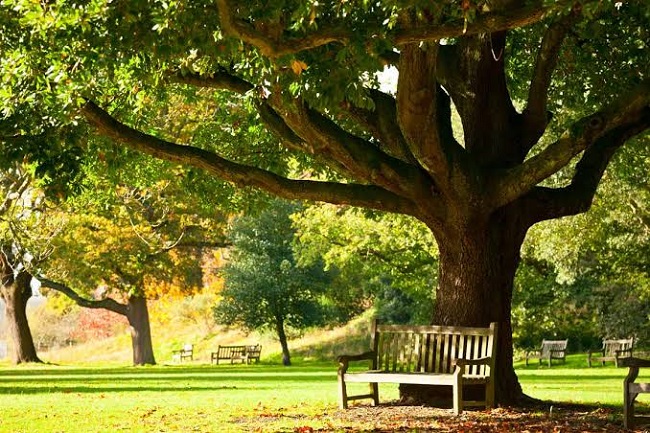The world is in dire straits due to pollution, greenhouse gas emissions, and dangerous radiation from cell phone towers. It is pertinent we embrace natural wholistic ecosystem solutions to solve our environmental challenges and fight pollution and gas emissions.

Trees are the best solution for the protection of cities and towns. Researchers have discovered that air conditioning in cities can be reduced by up to 13% if selected trees notable for their cooling effect are planted.
That is why even modern headquarters of companies worldwide are incorporating green architecture where buildings incorporate artificial greenery.
Trees or plant cover should be planted in such a way that people can walk or sit under them and benefit from the shade, and additional foliage should be planted in a way which shades homes and buildings from the sun.
Trees or vegetative cover cool through a process called evapotranspiration, which is where water produced during respiration evaporates from the leaves of trees or plants cooling the air.
The question remains: how do we incorporate tree planting into already densely populated areas that have few or literally no land areas for planting?
There are so many cities in Nigeria which originally did not have an ecosystem master plan which would have mandated that certain spaces and spots be conserved for the future planting of trees.
It is quite unfortunate that even where we have had areas where trees can dot specific places, such trees have been cut down for use as firewood. The growing demand for cheap sources of fuel and cooking supplies have forced common people to cut down the remaining ones left.
It’s mostly common people who are driven out of material need to cut at sight any tree they see. If they only knew there were alternatives to charcoal and kerosene that they could use to cook their meals. Even the so-called invention of fire or its discovery has a direct relation to our longevity or health wellbeing.
Most master plans do not have the provision or requirement for tree planting especially for offices, market areas and residential areas of the poor.
Most of the city plans in Nigeria do not have provision for open spaces which could have been used as spaces to grow shrubs or trees which can be used to bring back ecosystems and natural cooling.
It is only the rich and affluent neighbourhoods that have natural tree habitats dotted around the cities. In many affluent neighbourhoods, well-paved roads and better maintained buildings are common. You will observe rich green vegetation which promotes increased physical and mental activity, leading to lower stress levels and increased community health. Studies have shown that green cities or slums or regions have lower crime rate than lesser vegetated ones. Hence you can understand the mental health state of the affluent as opposed to those living in slums areas.
How do we mentally condition the poor masses living in slums to take up the challenge to plant trees again – not just to plant trees but understand natural ecosystems and embrace it and teach the upcoming generation? There is currently a propaganda to grow genetically modified seeds of trees as opposed to natural seed varieties that have been with us. This is a matter for further debate.
How do we encourage the communities of the slums and dense communities to embrace tree planting to dot their landscapes? Gone are those days when people who lived in the village had trees dotting their houses and had unlimited access to fruit trees, tree cover and fresh breeze all day and night. Nobody was hungry, all they had to do was pluck fruits from the trees and relax under the shade.
Trees take years to grow. How do you intend to protect the ones planted to maturity stage and not destroyed by pests or animals? Are there alternatives like shrubs that can temporarily cover a landscape just like you have modern buildings coming up with potted and hydroponic plants adorning its entire building to create a miniature cover of green scenery?
There is a growing effort amongst environmentalists in Nigeria to plant more trees, but they need to place more emphasis on people in lower income neighbourhoods to participate. More needs to be done beyond just offering monetary reward for tree planting.
There are more creative ways to collectively and socially condition people using music to embrace natural ecosystems. We are all witnesses to how music has negatively conditioned people to hate each other and embrace illegitimate means of acquiring wealth.
By Korede Ayanniyi (Freelance content developer with a passion for protecting the environment and restoring natural earth ecosystems)
